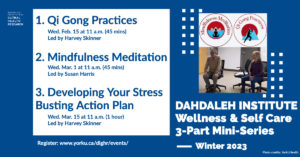Post
Published on April 3, 2023

On March 1, the Dahdaleh Institute welcomed Susan Harris to lead members of the community in a Mindfulness Meditation session, the second instalment to a three-part Wellness & Self-Care mini-series.
After a half-hour long guided meditation that encouraged participants to be present in the moment and reflect deeply, individuals were invited to engage in a candid Q&A session. Susan stated that although it is important to put mindfulness in its Buddhist context to derive the most benefit, a religious connection is not required to derive the significant mental, emotional, and physical health benefits of meditation.
Susan also explained that group practice sessions like this one can provide powerful motivation and learning that is not available in solo practice. However, individual practice allows for a daily routine that is key to integrating mindfulness skills.
For example, Susan distinguished skillful versus non-skillful responses, noting that mindfulness can increase the former. She described a skillful response as one that is non-harming, and following the intentions for how we want to be in the world. After all, as a participant said: “accepting” does not mean that all things are acceptable.
The mindfulness session with Susan was an excellent beginning to a more mindful March.
Watch the seminar presentation below:
Themes | Global Health & Humanitarianism |
Status | Active |
Related Work | |
Updates |
N/A
|
People |
You may also be interested in...
Postdoctoral Fellow, Resource Insecurity and Sustainable Livelihoods with the Global and Environmental Health Lab
Position titlePostdoctoral Fellow, Resource Insecurity and Sustainable LivelihoodsSupervisorDr. Godfred O. BoatengPay$60,000 CADTerm12 monthsHours per week40 (Full-time)LocationIn-office, Dahdaleh Institute for Global Health Research (York University, Toronto, Canada)Application deadline20th December, 2024Start date25th January, 2025End date1st February, 2026 ...Read more about this Post
Recap – Evaluating Health and Environmental Impact of Eco-Friendly Fuel Made From Water Hyacinth
On February 21, 2024, Dr. Reginald Quansah, senior lecturer at the University of Ghana and an environmental epidemiologist, presented his research on using invasive aquatic weeds, particularly water hyacinth, to produce biomass briquettes. This innovative ...Read more about this Post
Exciting New Events Scheduled for the Winter 2024!
The Dahdaleh Institute for Global Health Research has prepared an invigorating line-up of seminars for the start of the 2024 Winter semester. The events will feature a variety of topics covering the effects of climate ...Read more about this Post
